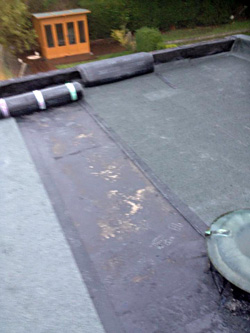For easier cutting unroll the material on a flat surface and use a hooked blade knife to cut the felt to the size of your shed s roof.
Use roof felt for garden underlayment.
Start the roof felt at one bottom corner of the roof.
Later asphalt was used in the manufacture of roofing felt.
For hundreds of years felt was the go to material to use for roofing underlayment.
Also known as tar paper roofing felt originated in finland in the 1870 s as a waterproofing underlayment for roofs.
The main advantage of using felt roofing underlayment is cost.
Any professional can measure and nail it all over the surface within a few hours.
Before applying roofing you ll need to cover the sheathing with roofing felt also often called tar paper most local codes call for using 30 pound felt.
For decades roofers have fitted a layer of felt over a roof s sheathing or roof deck before installing shingles.
What is synthetic underlayment.
Of course it is a bit more technical than that but this is the basic idea behind how felt works.
Today glass fiber or polyester fabric may be used instead of paper.
The underlayment roll is comfortable to sit on the roof floors and walls or anywhere you need it.
Long ago a 15 role actually weighed 15 pounds but over the years that has changed.
It provides backup protection in the event of ice or water damage.
The underlayment also has a slip proof polymer to the bottom.
To attach roof felt on a shed start by calculating the area of your roof and buying enough felt to cover it.
No 15 felt and no.
Still felt is an effective underlayment and sometimes might be the better choice for a project.
Why use roofing felt paper.
Felt roofing underlayment is typically available in two types.
In northern climates ice or snow dams are another common.
What is roofing felt.
Generally speaking roofing felt is a felt paper that is soaked in asphalt and other water resistant compounds to produce a membrane.
Felt is commonly sold in either 15 or 30 rolls measuring 36 inches wide.
It was only within the last twenty years that synthetic underlayment was introduced as an improved product that would not have the shortcomings of felt.
Wind driven rain or snow can trap water under your shingles putting your roof deck and inner residence at risk of moisture.
Roofing felt offers an additional layer of protection against the elements.
Tack it in place at the corner with the end flush with the end of the roof and the bottom edge of the roll right along the bottom of the roof.
First paper was impregnated with coal tar.










